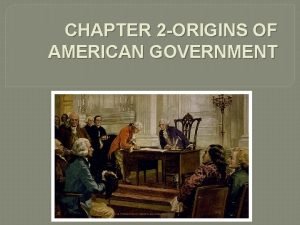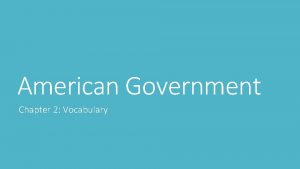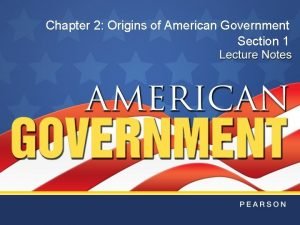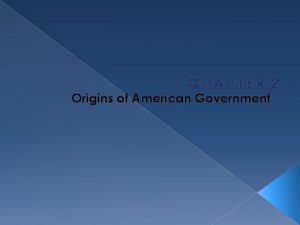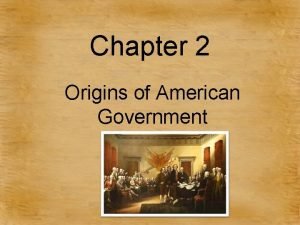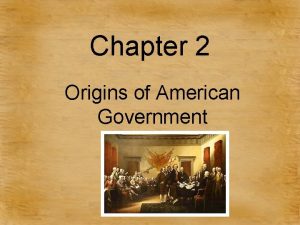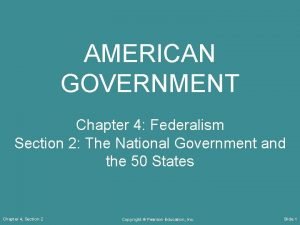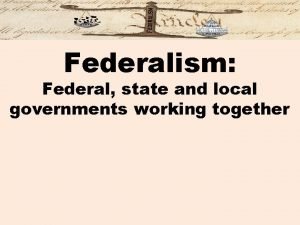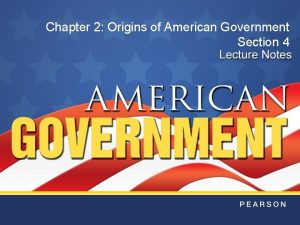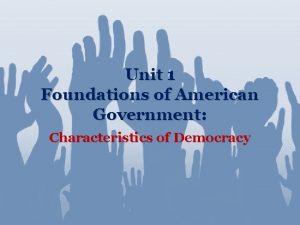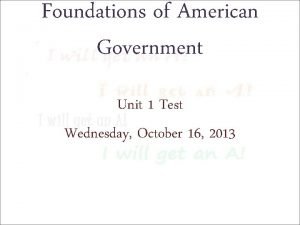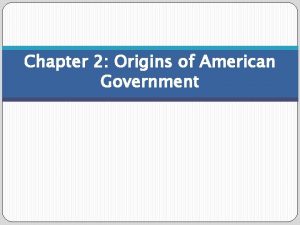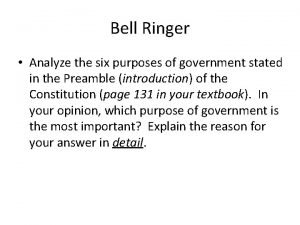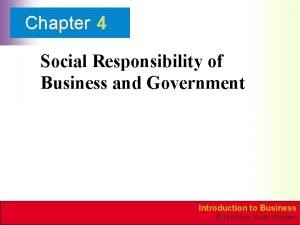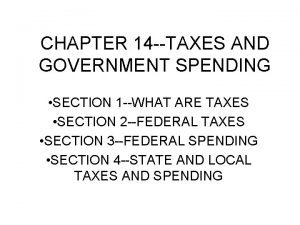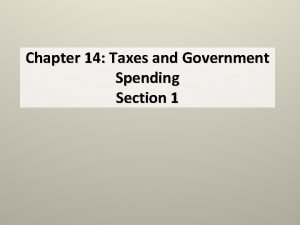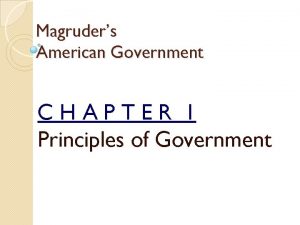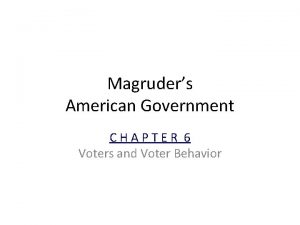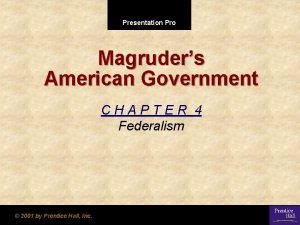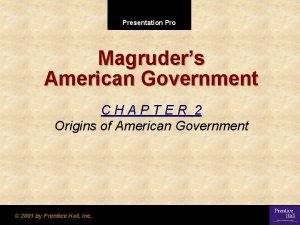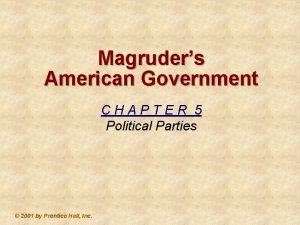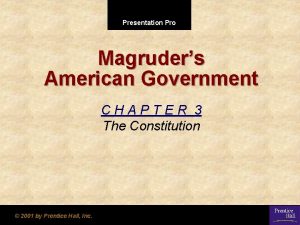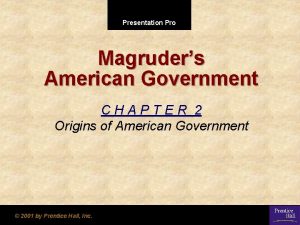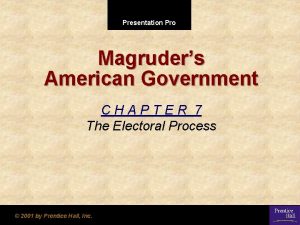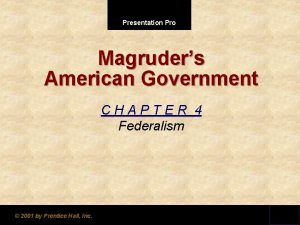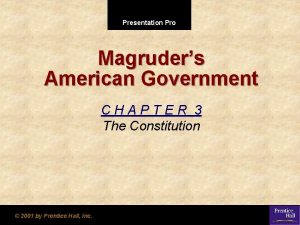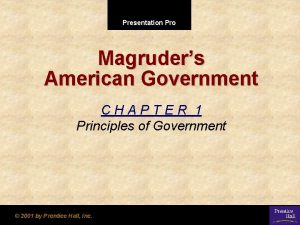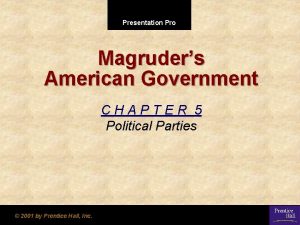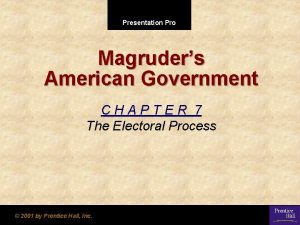Magruders American Government Chapter 1 American Government and


















- Slides: 18

Magruder’s American Government Chapter 1 American Government and the State

• Do you think society needs a government? Why or why not? • What are the main differences between a dictatorship and a democratic form of government? • Do you remember the three parts of the US government? Chapter 1 Section 1 Why government?

Government and Politics • Government includes the institutions that make and enforce public policies. • It is made up of people who have authority and control over people. • Politics is the process of resolving disputes. • According to Harold Laswell, “ Politics is who gets what, when, and how. ”

The State • • • We often use the term state and country to mean the same thing. A state is a body of people living in a defined territory. A state is organized with a government with the power to enforce laws.

Sovereignty • Every state is sovereign, meaning it has power within its own territory. • A state can decide its own domestic and foreign policies. • A democracy, where people make decisions, has popular sovereignty.

Forms of Government Dictatorship Democracy • A government ruled by a single all powerful ruler • Although similar to an absolute monarch, a dictator does not inherit power • A dictator takes power through force or persuasion (e. g. Hitler) • Rule by the people • Originated in Greece and Rome • A republic is a democratic government in which people elect representatives

Theories of Government Monarchy • • Divine Right of Kings Monarchs rule with power from God Democracy • Social Contract Theory • State is created to serve the people. . • Written Laws are a Constitution. • People can vote to change a government

American Government • Create a union of states • Establish justice with fair laws • Insure domestic tranquility, fair laws • Provide for common defense • Promote general welfare: services • Secure blessings of liberty: individual freedoms Chapter 1 Preamble of US Constitution Outlines Purpose of Government

Three Parts of Government • US established three branches of government: • Legislative branch makes the laws • Executive branch carries out the laws • Judicial branch interprets the laws.

• The Founders made the US a federal system of government in which power is shared between the national government and the states. Chapter 1 Section 2 The US is a Federal System of Government

National and State Power National Power • The US Constitution grants the national or federal government to be in charge of: • Coining Money • Interstate Commerce • Raising an Army • Declaring War State Powers • The 10 th amendment to the Constitution states that powers not belonging to the federal government are reserved for the states such as: • Police Powers • The running of schools

Confederate Forms of Government • A confederate form of government gives supremacy to the states and not the national authority. • Prior to the US Constitution the US had a weak central government under the Articles of Confederation.

Unitary Forms of Government • A unitary form of government is one in which the national government has power over the local governments. • National policy is carried out by regional and local governments. • For example, in Britain and France the central government dictates school policy • In the US, most school policy is up to the states and the local school boards.

The US has a Presidential System Britain has a Parliamentary system The British Parliament chooses the Prime Minister.

• Worth of the Individual • Individual Freedom • Equality of all persons • Majority Rule • Minority Rights • Necessity of Compromise Chapter 1 Section 3 Basic Concepts of Democracy

• Private ownership of businesses • The profit motive • Competition in the market place • Individual initiative Chapter 1 Section 3 Free Enterprise or Capitalism

Government and Markets • Government regulation of business • We don’t have pure capitalism but a mixed economy • Government builds roads, schools, and provides services

Democracy and Capitalism • Do individual freedom and economic freedom go hand in hand? • Must a democratic government have a capitalist economic system? • Can dictatorships be capitalist? (e. g China) • Can socialist countries be democratic? (e. g Sweden) • How much is our political system dependent upon our economic system?
 Magruder's principle
Magruder's principle Chapter 2 american government
Chapter 2 american government Chapter 2 origins of american government vocabulary
Chapter 2 origins of american government vocabulary Chapter 2 origins of american government answer key
Chapter 2 origins of american government answer key Chapter 2: origins of american government worksheet answers
Chapter 2: origins of american government worksheet answers Chapter 2 lesson 1 origins of american government
Chapter 2 lesson 1 origins of american government Chapter 2 origins of american government
Chapter 2 origins of american government Chapter 4 federalism answer key
Chapter 4 federalism answer key What are the three levels of government
What are the three levels of government Origins of american government section 4
Origins of american government section 4 Unit 1 government study guide
Unit 1 government study guide Unit 1 foundations of american government
Unit 1 foundations of american government Origins of american government section 1
Origins of american government section 1 Foundations of american government unit test
Foundations of american government unit test Origins of american government section 1
Origins of american government section 1 What are six purposes of the american system of government
What are six purposes of the american system of government Social responsibility of business and government chapter 4
Social responsibility of business and government chapter 4 Chapter 14: taxes and government spending section 1
Chapter 14: taxes and government spending section 1 Chapter 14 taxes and government spending
Chapter 14 taxes and government spending

